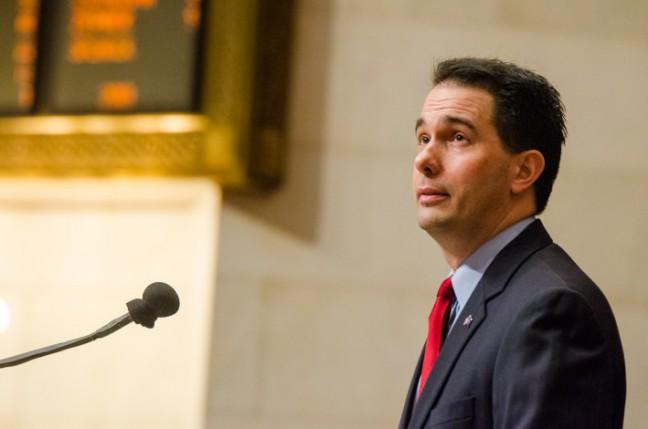Following the ruling of a Dane County judge, Gov. Scott Walker released records Friday that indicated he wanted to change the Wisconsin Idea.
The Wisconsin Idea is the University of Wisconsin System’s mission statement, which outlines that education should go “beyond the boundaries of the classroom.” In February 2015, there were reports that Walker’s budget proposal would delete this language and focus more on “meet[ing] the state’s workforce needs” instead of spreading knowledge.
Walker originally said any changes to the Wisconsin Idea were part of a “drafting error” and the state budget would include the full version of the Wisconsin Idea.
The 82 pages of documents, which the Wisconsin State Journal obtained Friday, were previously withheld from news outlets and the public for more than a year.
Emails in the documents indicated the revisions to the Wisconsin Idea were not a “drafting error,” but rather, driven by Walker.

Courtesy of Mary Bottari, Center for Media and Democracy
Upon learning of the potential changes, university officials asked the governor to reconsider. But Walker’s office denied their request, noting the governor himself was the one who wanted to make the changes.
Ultimately, Walker did not change the Wisconsin Idea.
The liberal Center for Media and Democracy and The Progressive magazine sued Walker’s office for the records related to the changes after his office denied their — and many other media organizations — request for the documents.
Dane County Circuit Judge Amy Smith ruled Friday these documents were “erroneously” withheld, and ordered for their release.
Of the documents in question, it was ruled that all 12 emails strings and six of nine attachments should have initially been disclosed to the public when requested. Three attachments were properly withheld from the public, according to the ruling.
Mary Bottari, CMD deputy director, said CMD felt “vindicated” by the ruling. Bottari said she was happy the truth was brought out.
“It’s an extremely deliberate process of changing UW’s mission statement, and he was actually advised against doing it,” Bottari said.
The documents were not initially released due to the concern they could conflict with the “deliberative process” of making legislation, according to court documents.
Robert Drechsel, UW journalism and mass communication professor and media law expert, said there is concern that if particular information is released, legislators would hold back on expressing their opinions about bills or legislation, thereby hindering the “deliberative process” of the Legislature. Though this concern is important, Drechsel said it can be taken too far.
“It’s an incredibly broad term and my fear would be that government offices and officials could hide almost anything behind the curtain of a deliberative process,” Drechsel said.
But in her official opinion, Smith wrote that Walker’s request to withhold the records was “untenably massive in scope,” and accepting Walker’s argument could lead to a “blanket exception for any communication or document that had any relevancy to ongoing Budget Bill debates.”
According to Smith’s ruling, Wisconsin does not recognize a deliberative process privilege when determining whether something is subject to open records. The court took the concern of deliberative process into account, but determined that the public interest of disclosure was more important.
Public Records Board unanimously reverses decision said to have limited open records access
Drechsel said each record undergoes a balancing test to determine if it’s in the public’s best interest to release the information or withhold it. He said preference always leans toward disclosure.
“It makes good public policy sense to say, ‘no you can’t have access to this information, or you can’t sit in on this particular meeting,’ but that ought to be the exception and not the rule,” Drechsel said.
Walker’s office issued a statement after the release of the records, emphasizing the governor’s commitment to “openness and transparency in government.”
“We appreciate the clarification and guidance provided by the court’s decision, which were necessary to confirm the types of drafts that are not records,” the statement said. “We will continue to comply with the public records law.”


